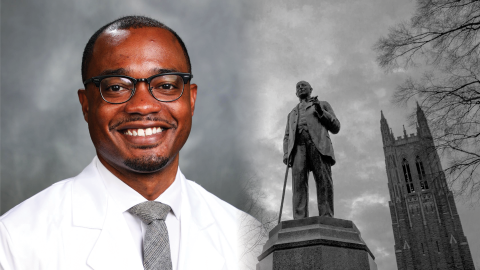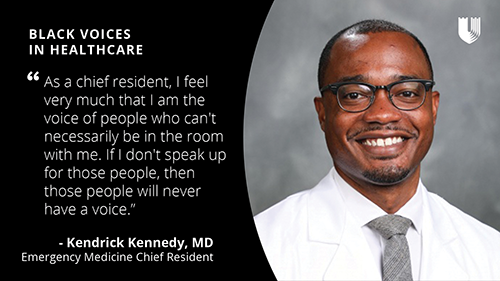
This piece is part of a series featuring Black voices from the surgical and emergency medicine communities at Duke.
About Dr. Kendrick Kennedy
After receiving a bachelor of science in nursing degree from the University of South Carolina-Aiken, Dr. Kennedy served for 4 years as a nurse on a cardiac unit before finding his way to medicine. He attended medical school at the Medical University of South Carolina in 2014 before coming to Duke for his emergency medicine residency.
Q: You shared that when you were a child, you wanted to be a doctor or an actor. What was your perspective on race then, and did you feel that race would be a barrier for you in accomplishing your goals?
Absolutely not. I remember being a kid and my dad and my mom telling me that I could do anything that I wanted to do. There was nothing that I couldn’t achieve, especially if I worked hard. I also felt like I had the support of the people around me. I never felt that because I was Black, even now, that it would prohibit me from doing things that I wanted to do. I'm one of those people that if I am determined to do something, it will get done. There's more than one way to accomplish that goal.
I know that there are some people who have not been as fortunate as I have been. I was blessed with parents who helped to nurture my desires, but that's not the case for every person of color. My hope is to also act as a mentor and an example of the things that people can do.
Q: What made you decide to pursue a field in medicine?
It wasn’t until my grandfather passed away in my junior year of high school that solidified my desire to be a physician. I saw how the practitioners, physicians, and nursing staff worked with voracity to save my grandfather’s life.
Going through high school and through college, I looked at the environment around me and saw that many had what I would call a small town mentality, where they look at only what is in front of them. I want to look beyond that, and take other people along with me. That’s why I’m very passionate about helping the next generation of physicians in training. It would have been very much appreciated by me if I had someone who looked like me to be a mentor. Even now, most times when we see people of color in in the healthcare setting, they are usually reserved for support staff as a custodian, food service, and things of that nature.
Q: People from different generations have sometimes vastly different life experiences. Could you describe how your experience might be different than the previous generation of people of color?
I fully acknowledge that I am a product of my parents’ hard work, and that I am, for lack of a better term, able to benefit from their trials and the obstacles that they have gone through. They have opened the door wide open for me, and now my responsibility is to keep that door open for the next person. It's much harder to open the door than it is to keep it open. I fully acknowledge that those people who have come before me have had a much harder road. I also understand, too, that we are not that far removed from Jim Crow, and to an extent, some of those institutions are still in place. Racism can be more institutionalized and veiled.

Q: Looking at the history of medicine, and at Duke, we see that the majority of those in medicine were white. As a person of color, how does that affect your training and experience?
I don't ever want people to get the idea that I'm trying to be exclusionary. Because I'm trying to step forward, doesn't mean I want anyone else to step back. I think that is the crux of where the disagreements with different cultures and individuals begins to happen. I'm just trying to get on the same level as others. I'm not trying to take anything away. I just want to be in the room with you. There is no reason we can’t all succeed together.
As a chief resident, I feel very much that I am the voice of people who can't necessarily be in the room with me. If I don't speak up for those people, then those people will never have a voice.
Q: Have you had a chance to mentor other residents, or med students that are on the emergency medicine track?
Yes, especially with my role as chief resident. COVID-19 has changed our recruiting. I’ve reached out to medical students to set up Zoom calls with people who are interested in Emergency Medicine. I now have 15 to 20 med students who I talk to on a consistent basis. I’d love to help them achieve their goals.
For Black medical students, even if it's sometimes unsaid, just having a conversation with people like you and being open, you find that people sometimes can relate to you more because there's this perceived shared experience. Once you have that barrier removed, it is a two-way street. We can both benefit from the relationship.
Q: This year has been a difficult one, first with COVID-19 and then with the pandemic of racism in our country. What has your experience been this year, and what can Duke do to continue moving us forward in a positive direction?
We see how COVID-19 unfortunately disproportionately affects people of color. But that's no different from any other disease process or other more chronic issues: HIV, diabetes, high blood pressure—those will disproportionately affect people of color. We also think about access to healthcare, access to good insurance, and the barriers that prevent people from getting those things. COVID-19 now shines a spotlight on these things.
It's not just a healthcare issue, but it is a broader societal issue that people who are disadvantaged are not just disadvantaged in one area of life. What we now need is not only for the medical community, but specifically Duke, to put the full weight of its power behind this effort. Duke is an institution that everybody knows. Its name carries weight, and if Duke says that we are going to devote resources, time, and people to this effort, then we can make a huge impact on how this moves us all forward. Not just as a country, but even in our backyard in Durham, North Carolina.
